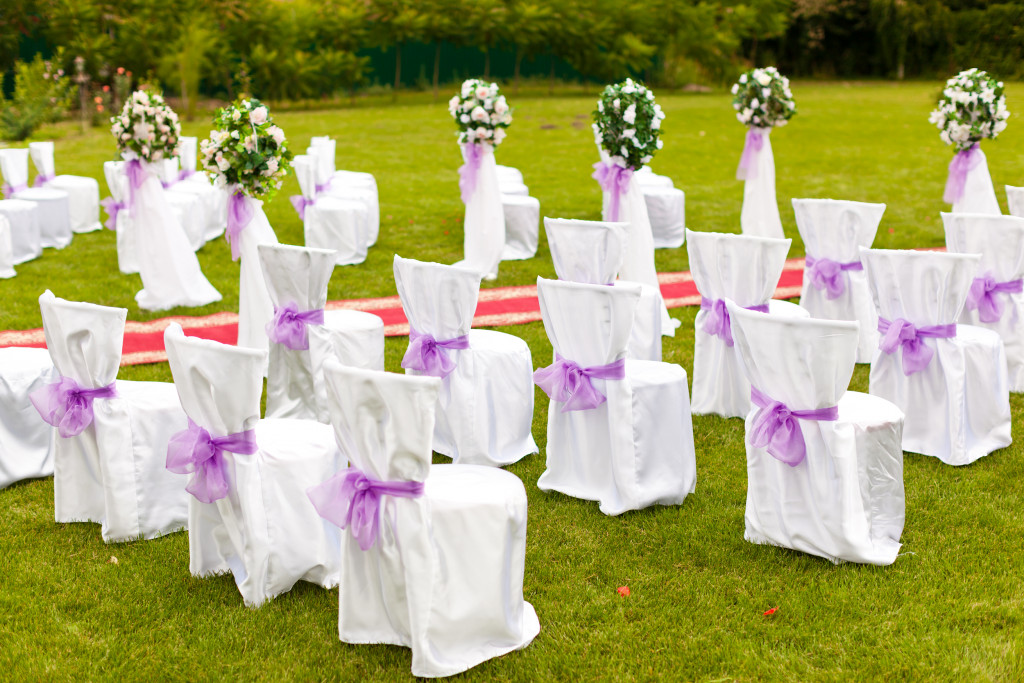A sign of the times: designers and fashion labels are coming up with “COVID-19 couture,” or “pandemic chic,” lending fashion sensibilities to masks and other essentials. Wherever you fall on the spectrum of beliefs about the need to wear masks, it’s undeniable that 2020 is going to make things we used to take for granted like weddings unrecognizable in 2020.
63% of more than 900 engaged people in the U.S. have said they’re postponing their weddings, in a survey conducted by Lendingtree in March. Considering the American wedding industry was worth $54 billion in 2019, that’s a considerable disruption not only to the couple, who on average put down a sizable amount of money on their deposits, but to the vendors and suppliers as well.
As the country begins to reopen, though, is it time to get those plans back on track? Can we afford to push through with the Big Day, even as we register record highs in cases?
Is it safe to have large weddings again?
 Japan, which has managed quite well in keeping its cases down, has given its citizens prevention guidelines with an easy reminder: avoid the Three C’s:
Japan, which has managed quite well in keeping its cases down, has given its citizens prevention guidelines with an easy reminder: avoid the Three C’s:
- Closed spaces with poor ventilation
- Crowded places, and
- Close-contact settings where are together for extended periods, like conversations
A traditional American wedding, unfortunately, is all of these things. You could mitigate some of these risks, like having your ceremony in the open, or keeping your guest list down, among other things. The CDC has also released some (less catchy, but equally valid) guidelines for events and gatherings during the pandemic, with some critical points:
- Have smaller outdoor gatherings.
- People from different households should stay six feet apart.
- Everyone should use masks.
- Practice hand hygiene.
- Invite only guests from the same area.
So if a traditional wedding can put people at risk, what are the alternatives?
Postponement
Of the couples surveyed by Lendingtree who postponed the ceremony, 40% have decided to put off their plans in late 2020 or 2021. An added advantage to postponement is that many couples have successfully kept their original vendors, so they didn’t need to try to get their deposits back.
The survey showed that the following suppliers were willing to postpone and work with the couple on their new dates:
- Photographers (66%)
- Cake makers (59%)
- Wedding venues (56%)
Many women also reported being able to work something out with their bridal boutique and caterer. Another new 2020 wedding trend is the rise of the “Change the Date” card, which has been on the rise in sites like Pinterest.
Say “I Do” over Zoom
The ultimate in an appropriately-social distanced wedding is the virtual ceremony. The states of New York, California, Ohio, and Washington are now allowing couples to get marriage licenses remotely, and for clerks to perform ceremonies via video conference. Local marriage laws may vary significantly from place to place, though, so couples planning to take this route should check with their county clerk’s office to make sure everything is aboveboard.
There are now many guides on how to hold a virtual wedding (another sign of the times). They advise on how to prepare for and stream your ceremony and reception.
Because the pandemic is an unprecedented event that has and will have effects on everyday life, it’s best for all of us to find a way to continue as best we can while keeping our loved ones, such as your spouse, family, and friends, safe.
There are solutions to the difficulties presented of exchanging vows in 2020, but think of it this way—if you can get married and build a life together in times as challenging as these, everything else will be a cinch!